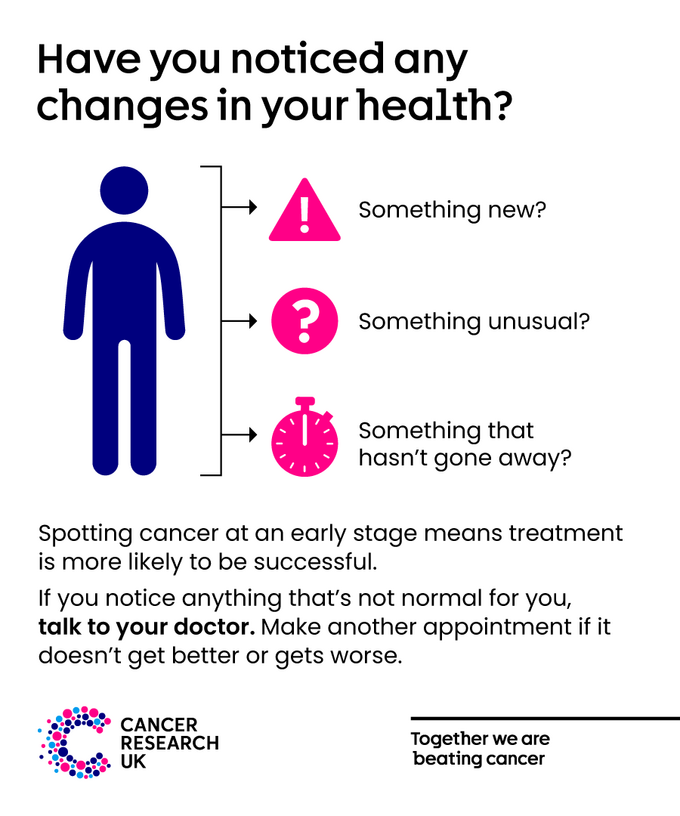How do I check for cancer?
- It’s good to be aware of what your body usually looks and feels like. But there’s no need to check yourself at a set time or in a set way.
- If you notice anything unusual for you, listen to your body and tell your doctor.
- Spotting cancer at an early stage can save lives.
This page has advice on self-checking for cancer. Our advice is based on the best scientific studies that look at lots of people over long periods of time. Some of it may surprise you or be different to what you were told in the past. But the best research shows that there’s no one way to check your body for cancer. And people who self-check regularly are no more likely to survive cancer. So there is no need to check yourself regularly at a set time or in a set way.
We talk about breasts or chest, and testicles in more detail on this page because people often ask if they should check these body parts.
Should I check my body for cancer?
Lots of people talk about doing ‘self-checks’ (also known as self-examinations or self-exams) at home, to try and spot cancer early. But there’s no good evidence to suggest that regularly self-checking any part of your body at a set time or set way is helpful. It can actually do more harm than good, by picking up things that wouldn’t have gone on to cause you problems. This can lead to unnecessary tests or treatment, that may have side effects and cause worry.
If you know what’s normal for you, it’s easier to notice if anything changes. So instead of regular self-checks, be aware of what is normal for you and listen to your body if it’s telling you something isn’t right.
“The advice now is not to be fixated on checking on a regular basis – unless you’ve been told to do so by a healthcare professional,” says Dr Ameesh Patel, North East London GP and Havering North Primary Care Network Cancer Lead.
“You should be body aware, which means you should be aware, from a young age, of your body appearance and what the feel of your body is, and then you have a good baseline of normality for you”
Self-checking is different to cancer screening. Screening is a test that looks for early signs of cancer in people without symptoms – learn more about screening for cancer.
What should I look for?
There are over 200 signs and symptoms of cancer so it’s not possible to remember them all. It’s also not your job to know what’s wrong. Some common cancer symptoms are easy to see, but others can happen inside your body making them difficult to see or touch. So, the best thing you can do is to tell your doctor if you notice anything that’s not normal for you. In most cases it won’t be cancer – but if it is, spotting it early can make a real difference.
Should I check my breasts or chest?
It is good to be breast aware. This means knowing what your breasts or chest usually look and feel like, so you know what’s normal for you. This includes knowing what your breasts are like at different times of the month. But you do not need to check your breasts or chest at a set time or in a set way.
Research has shown that women who regularly self-check their breasts aren’t any less likely to die from breast cancer. But they are almost twice as likely to have an unnecessary test (biopsy) on a lump that turns out not to be cancer.
Remember, it’s still important to listen to your body and tell your doctor if you’ve noticed any unusual lumps or other changes to your chest, breasts or nipples that aren’t normal for you. If something’s not quite right (no matter how you find it), get it checked out.
You can find out more about breast changes to look out for on our breast cancer symptoms page.
Should I check my testicles?
It’s a good idea to know what your testicles usually look and feel like, and to be aware of their normal size and weight. This can make it easier to spot unusual changes, which you should always tell your doctor about.
But there’s no need to regularly self-check at a set time or in a set way, as there is a lack of evidence showing a benefit to testicular self-checking.
Remember, it’s still important to listen to your body and tell your doctor if you’ve noticed any unusual lumps, swellings or other changes to your testicles that aren’t normal for you. If something’s not quite right (no matter how you find it), get it checked out.
You can find out more about finding testicular cancer early and when to see your doctor.
Office for National Statistics, Cancer survival in England: adult, stage at diagnosis and childhood - patients followed up to 2018. Accessed September 2022. https://www.ons.gov.uk/peoplepopulationandcommunity/healthandsocialcare/conditionsanddiseases/bulletins/cancersurvivalinengland/stageatdiagnosisandchildhoodpatientsfollowedupto2018
Cochrane Review, Regular self‐examination or clinical examination for early detection of breast cancer. Kösters JP, Gøtzsche PC. 2003. https://doi.org/10.1002/14651858.CD003373
Cochrane Review, Screening for testicular cancer. Ilic D, Misso ML. 2011. https://www.cochranelibrary.com/cdsr/doi/10.1002/14651858.CD007853.pub2/full
Last reviewed: 17 October 2022
Next review due: 17 October 2025



